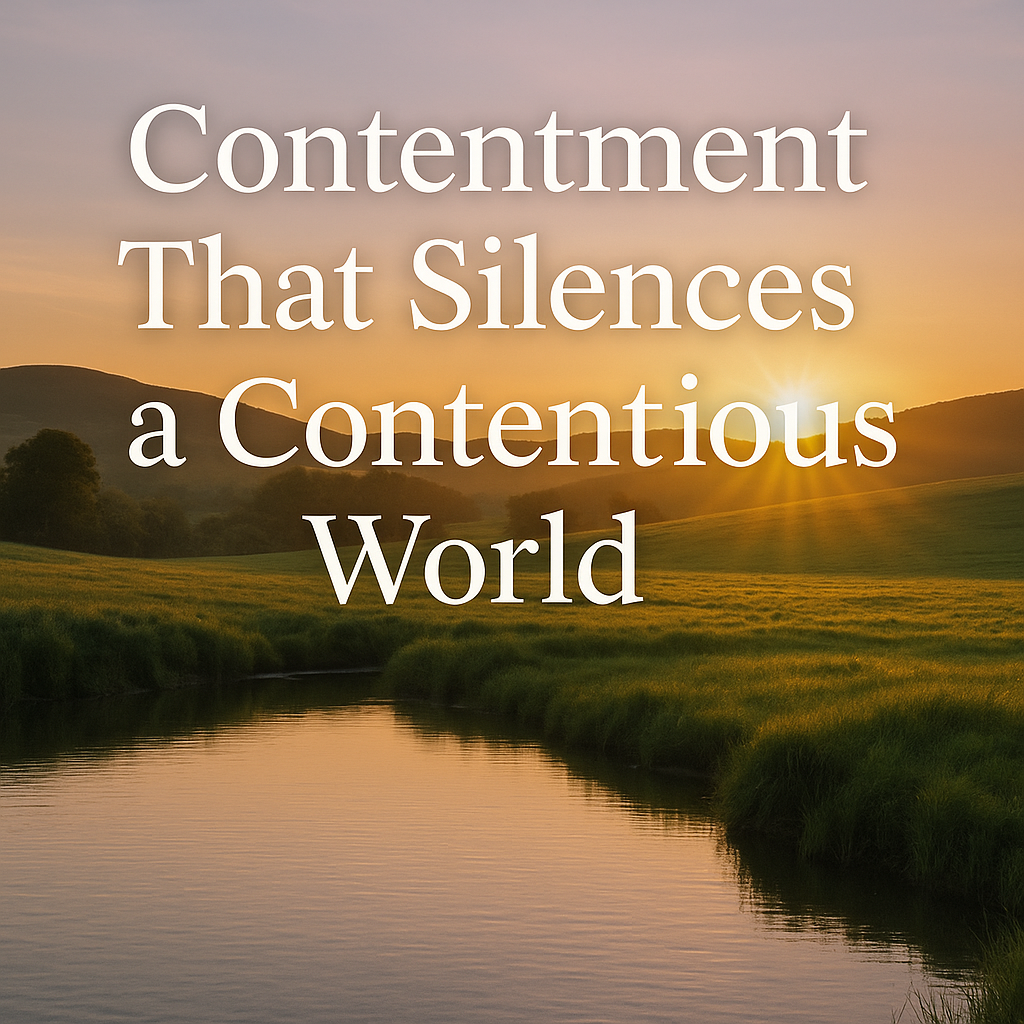⏱️ Estimated Reading Time: 4 min read
Gratitude That Endures: Cultivating Thankful Hearts in Christ
Contentment That Silences a Contentious World
By Jeff Mingee ·
We live in an increasingly hostile age. Contentiousness feels like our culture’s default setting. It does not matter the topic, we arrive ready to argue and determined to win.
Yet one of the most striking marks of a heart gripped by the gospel of grace is contentment that stands in contrast to a culture of contention. In an age of outrage and cancel culture, Christians are called to “shine as lights in the world” (Philippians 2:15).
“Christian contentment is the direct fruit of having no higher ambition than to belong to the Lord and to be totally at His disposal in the place He appoints, at the time He chooses, with the provision He is pleased to make.”
Contentious people refuse to lay down their rights. They do not bear burdens, seek peace, or love their neighbor. Christians do. Content Christians do. Because we belong to Christ, we have every reason to be content, grateful, and at rest in Him.
Below are four reasons believers can be content and shine as thankful witnesses in a restless world.
1. God provides for you
Jesus tells His disciples not to be anxious about food, clothing, or daily needs:
“Look at the birds of the air… your heavenly Father feeds them.”
(Matthew 6:25–26)
And Paul reminds us:
“My God will supply every need of yours according to his riches in glory in Christ Jesus.”
(Philippians 4:19)
When we remember the Father’s faithful provision, the restless spirit that fuels contention loses its grip. We do not need to prove ourselves or fight for our place. Instead:
“Humble yourselves, therefore, under the mighty hand of God so that at the proper time he may exalt you.”
(1 Peter 5:6)
God provides. We can rest.
2. Christ died for you
Nothing quiets contentiousness like the cross. Our heated debates about politics, crises, cultural battles, and personal preferences grow strangely dim when we kneel before the Lamb who was slain. Christ bore our judgment. His death satisfied the righteous wrath of God.
Paul called this gospel “of first importance” (1 Corinthians 15:1–3). If Christ has died for us, we do not need to fight for status or vindication. The crucified and risen Christ is enough to make us content, and more than that, He intercedes for us even now.
3. The Spirit empowers you
Jesus promised that the Spirit would dwell with us and in us (John 16:7). The Spirit strengthens believers to abound in hope (Romans 15:13) and to serve with Spirit-given gifts (1 Corinthians 12:4–11).
The Holy Spirit does not equip us to win arguments for argument’s sake. He empowers us to lift high the name of Jesus.
Believers who devote themselves to spreading the gospel widely and fruitfully will know the Spirit’s power most fully.
J. I. Packer, Keeping in Step with the Spirit, p. 202.
Contentiousness distracts us from Christ’s mission. Contentment strengthens it.
4. God is good to you
David concludes Psalm 23 with confidence:
“Surely goodness and mercy shall follow me all the days of my life.”
(Psalm 23:6)
Contentment flows from trusting the goodness of God. While the world grumbles over what is wrong, believers rejoice in the goodness and promises of our God. He declares to His people, “My people shall be satisfied with my goodness” (Jeremiah 31:14).
Our story ends not in loss, but in joy. Not in fear, but in eternal fellowship with God. That hope produces deep, lasting contentment.
A Heart Exam for Contentment
- Is the gospel of first importance to you right now?
- Are you dwelling on the goodness of God revealed in Christ crucified for you?
- When the world shouts and complains, are you relying on the Spirit’s empowering presence?
- Are you resting in the goodness and provision of God?
A contentious world needs to see content Christians who treasure Christ above all. May the Lord make us people who display grateful, gospel-shaped contentment in a restless age.
Notes
- John Murray, Redemption Accomplished and Applied (Grand Rapids: Eerdmans, 1955), Preface to the First Edition.
- J. I. Packer, Keeping in Step with the Spirit: Finding Fullness in Our Walk with God (Grand Rapids: Baker, 2005), 202.
Jeff is the glad husband of Lauren and the proud dad of Aiden and Carter. He pastors Catalyst Church in Newport News, VA and works as a Church Planting Strategist with the Southern Baptist Convention of Virginia. Jeff is the author of Called to Cooperate: A Biblical Survey and Application of Teamwork.




